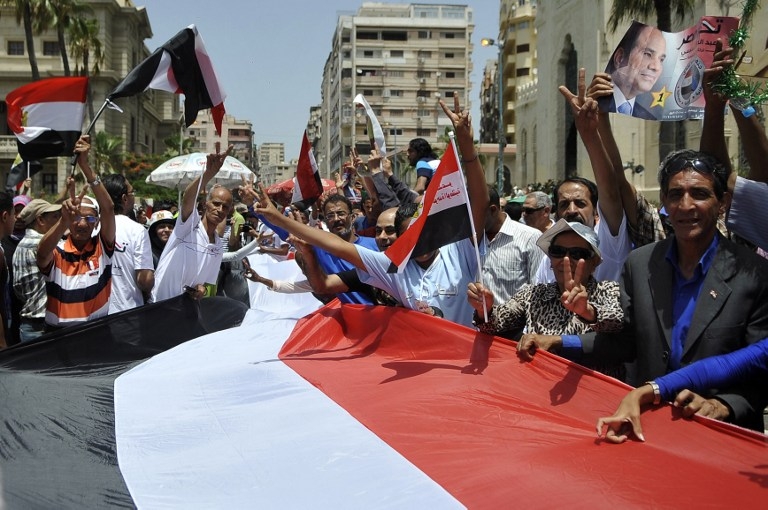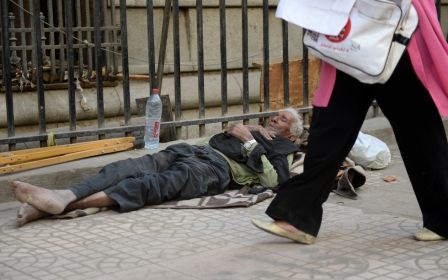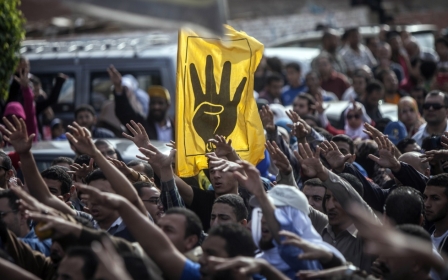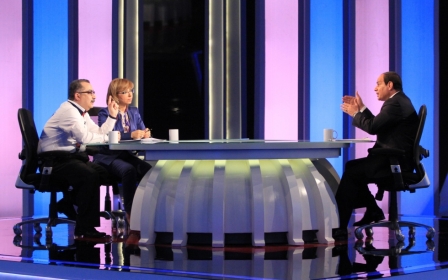The consequences of reporting Egypt's coup

I didn't vote for former Egyptian president Mohamed Morsi in the first round of presidential elections after 25 January revolution. My vote went to Abdel Moneim Aboul Fottouh, the man who was expelled from the Brotherhood and who ran as an independent candidate.
When I learned that the run-off would be between Morsi and Ahmed Shafiq, the man Mubarak appointed as his prime minister during the 18 days of the revolution which ousted him, I like many others voted for Morsi. Like many others, I cheered his victory over the representative of the old regime.
I have never been a member of the Muslim Brotherhood and I have many differences and disagreements with them before and after they came to power. But I respect them and the results of the five elections which brought them to power.
I have to say all this before recounting what happened to me last year in the run up to the 3 July coup.
The phone rang in early December 2012, a few days after then president Morsi issued his controversial constitutional decree in November. On the other end was one of the aides of Supreme Council of the Armed Forces (SCAF) whom we, as journalists, have been in touch with since SCAF assumed power after Mubarak’s ouster.
He urged me to join the protests outside Morsi’s official residence, Ittihadiya presidential palace, and he went on and on about how much they hated the Brotherhood and could not understand them being in power.
It was a common enough sentiment. The Muslim Brotherhood had been banned since 1954 - in other words for most of our lives. The ban was lifted after the revolution in 2011 and only then was it allowed to form a political party and nominate a presidential candidate. I had had many such conversations. A police officer had told me earlier that he could only imagine the Brotherhood being behind bars.
But the call itself was significant. In retrospect, it was evidence of the military actively laying the groundwork for the coup that was to follow.
A senior military officer expressed similar feelings. He admitted to me, in a long meeting in his office that, feelings aside, "Morsi is really working hard, but he is being trampled". He spoke with bitterness about the "revolutionary youth" and those who chanted "down with military rule" and vowed that those people would beg the army to interfere, but the army won't go back to politics "as it will be considered a coup and no one especially the US will recognise it".
That was in late January 2013.
I called him in mid-June last year and asked him about his expectations about the 30th of June, the day which a group called Tamarod (rebellion) had called for mass protests to oust President Morsi. Where, I asked him, did the army stand?
He told me it all depended on the numbers of people who were going to turn up: “5,000 is different than 50,000 or 500,000 or 15 million. And we want people to take to the streets ... Do you get the message?”
I did, and many who took to the streets that day got the message and were encouraged by the statements by military spokesmen at the time.
However, president Morsi and his advisors didn't. They still trusted Abdel Fattah el-Sisi, the career officer whom Morsi appointed as a defense minister in August 2012. He was the head of military intelligence under Mubarak and a member of SCAF. The military source I spoke to, on the condition of anonymity, was close to Sisi. So what I was getting was what Sisi was really thinking and planning.
The Egyptian media, both private and state owned, played a major role in demonising Morsi and the Brotherhood by spreading lies and rumours, and starting a hate campaign against them. The organised links between the military and the media were not surprising as in a leaked video, Sisi himself admitted to military officers in December 2012 that the military was “extending its arms into the media”.
I felt it personally. Many of those who began insulting me used to be friends and colleagues in the Egyptian media. The denunciations came on air, in the social media and in print. The firestorm started when I tweeted “military coup” in Arabic and English as Sisi was reading his statement on 3 July.
A week later, on 10 July, I received two phone calls from a private number. The caller insulted me with obscenities and issued specific threats. I was left in no doubt that if I did not shut up and stop calling 3 July a coup, if I did not stop demanding the whereabouts of Morsi and his presidential team, a lawsuit would be fabricated against me.
Two weeks later, a yellow, privately owned paper called Al-Fagr, published a half page with my picture along with photos of other Egyptian political scientists who live abroad and oppose the coup like me, claiming we were paid agents - a gang - who tweeted in English, telling the outside world that what happened was a coup and not a revolution.
I've known and worked with the writer of that article, as well as the editor. We worked together in Rose El-Youssef magazine in the 1990s. Neither of them thought it worth their while to call me and ask my opinion. What they put their names to was incitement, pure and simple.
That was followed by defamation and incitement tweets and Facebook posts full of false information about me and calls for my arrest. I was accused of being a Zionist, a member of the Masons and the Brotherhood in one and the same sentence.
Neither the head of the Press Union ,nor lawyers nor human rights activists did anything to help me or to defend me. People whom I used to consider friends and colleagues remained silent or hostile. To them, at the time, not supporting the coup was tantamount to being with the Brotherhood. It became very clear to me that life as I knew it in Egypt had come to an end.
After 25 years of working as a journalist in Egypt, it became very difficult to work there as an independent journalist who opposes the coup and its crimes. Thousands have been killed, injured and detained and imprisoned since then.
Politically and socially life has become unbearable under the threat of arrest or summary execution.
I left Egypt in early September 2013 and have never been back. My fears became true after they arrested my colleagues in Al Jazeera English in December and sent them to a sham trial.
Like many Egyptians who oppose the coup and especially those who work or talk on Al Jazeera, my name is now on a watch list at airports. I am not charged with any offence, but if I go back I will be arrested.
Life in exile is not easy. I wasn't able to attend the graduation of my only son Youssef from high school on 23 June. But that happened on the day a court sentenced Al Jazeera journalists to between 7-10 years in prison. So exile is better than compromising your ethics, morality and independence as a journalist by serving as an unthinking cog in a brutal military dictatorship. Exile is better than a prison cell on false charges, or often no charges at all.
I am proud of the fact that I did not take part in spreading lies or inciting against the people I regard as fellow Egyptians. I'm also proud I didn't cheer or remain silent when security forces started killing protesters on 8 July, in several incidents leading to the massacres of Rabaa and Nahda sit ins on 14 August 2013.
I believe that this regime with its crimes and insane policies is unsustainable and that Egyptians deserve real democracy not military or any dictatorship.
I salute the real heroes all those who are still opposing and protesting against the coup despite the killings, detentions and torture.
Egyptians deserve and will achieve the demands and slogans of 25th January revolution: Bread, Freedom, social Justice and human dignity. It may take time, and much suffering to come, but it will happen.
- Nadia Abou El-Magd is a political analyst. She has covered Egypt and the Middle East for 25 years, mainly working with AP. She has also worked for AlJazeera English in Cairo, alongside various English and Arabic publications. Since August 2013, she has been working as a political & media analyst with AlJazeera Mubasher Misr (Egypt)
The views expressed in this article belong to the author and do not necessarily reflect the editorial policy of Middle East Eye.
Photo credit: A pro-Sisi protest in Cairo earlier this year (AFP)
New MEE newsletter: Jerusalem Dispatch
Sign up to get the latest insights and analysis on Israel-Palestine, alongside Turkey Unpacked and other MEE newsletters
Middle East Eye delivers independent and unrivalled coverage and analysis of the Middle East, North Africa and beyond. To learn more about republishing this content and the associated fees, please fill out this form. More about MEE can be found here.





